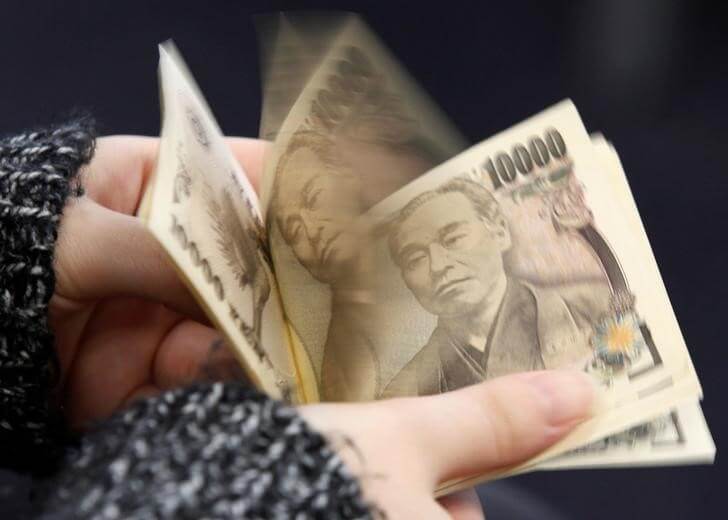By Leika Kihara and Tetsushi Kajimoto
TOKYO (Reuters) – Japan has stepped up threats to intervene to weaken the yen after Britain’s vote for “Brexit” drove the currency to multi-year highs, but the risks of a costly failure may dissuade policymakers from matching words with action. The Bank of Japan (BOJ) is also wary of rushing into expanding its monetary stimulus, preferring to wait to see if the market turmoil triggered by Britain’s vote to leave the European Union lasts long enough to threaten Japan’s economic recovery, according to sources familiar with its thinking. “When markets are moving on factors unrelated to Japan, it’s doubtful whether any action – be it intervention or more easing – would be effective,” one of the sources said. Japanese policymakers, who have warned for months that they could act to curb the currency’s strength, watched helplessly on Friday as the unfolding result of Britain’s referendum took the yen easily above the key threshold of 100 to the dollar One official said he was too shocked to gather his thoughts as the result, which wrongfooted markets that were positioned for a “remain” vote, happened “all of a sudden”.
Wary of the damage the yen’s spike inflicts on exports, Japanese Prime Minister Shinzo Abe on Monday instructed Finance Minister Taro Aso to watch currency markets “ever more closely” and take steps if necessary. The yen is sought as a safe-haven currency in times of market stress due to Japan’s huge net foreign assets and current account surplus – factors that encourage flows into the currency during bouts of risk aversion as Japanese firms repatriate cash. Senior government and BOJ officials have met several times, including on Saturday, to discuss how to deal with the market turbulence – largely as a signal to markets that they are gearing up for action. With the dollar having eased back to around 102 yen, however, Japanese authorities are hesitant to conduct solo intervention unless the currency makes a sustained rise back above 100, say government and central bank officials with knowledge of currency affairs. “At this moment, the impact turned out to be somewhat smaller than we thought,” said one official.
“We need to watch movements from now on,” the official said, adding that Japanese authorities probably needed more clarity on where markets were heading before deciding whether to act.
CAUGHT IN A BIND
Japanese officials are caught in a bind. The effect of jawboning will wane unless Tokyo backs up the talk with deeds. But there are plenty of reasons to hold off from acting.
By stepping in to sell the yen, Tokyo risks infuriating Washington, which has warned against intervention that could be seen as seeking to give Japanese companies a competitive advantage.
“It’s very difficult to justify intervention by the Japanese government,” said Seki Obata, a former finance ministry official who is now associate professor at Keio Business School. “The Japanese government actually wants to intervene but all it can do is talk, so it’s inflating its lip service.”
There is also no guarantee solo intervention could turn the market’s tide in Japan’s favor, particularly with the yen being driven up by factors beyond Tokyo’s control.
The key worry among global policymakers is the possibility Brexit might trigger a shortage of dollars, which are in high demand from banks and investors in times of uncertainty.
If Japan were to sell yen to weaken its currency it would be mopping up dollars from the market – a move that could exacerbate any shortage of dollars, one of the sources said.
“Intervening solo won’t work,” the source said. “It would be going against the global trend.”
Some market players speculate that BOJ Governor Haruhiko Kuroda, a former top currency diplomat, may attempt to shock markets into selling the yen by further expanding the central bank’s massive money-printing program. With markets already predicting more monetary easing at its scheduled meeting in late July, they say Kuroda could spring a timing surprise by calling an emergency meeting in coming days.
But Kazuo Momma, a former top BOJ official who oversaw the bank’s monetary policy drafting, said he did not expect the BOJ to hold an emergency meeting soon.
“If needed the BOJ can hold an emergency meeting any time,” Momma said. “But Japan’s economy is gradually improving and job conditions are near full employment. I don’t see a strong need for the BOJ to ease immediately.” (Additional reporting by Minami Funakoshi, Stanley White, Kaori Kaneko, Sumio Ito and Yoshifumi Takemoto; Editing by Alex Richardson)
Japan may struggle to match threats of FX intervention with action

By Leika Kihara and Tetsushi Kajimoto















